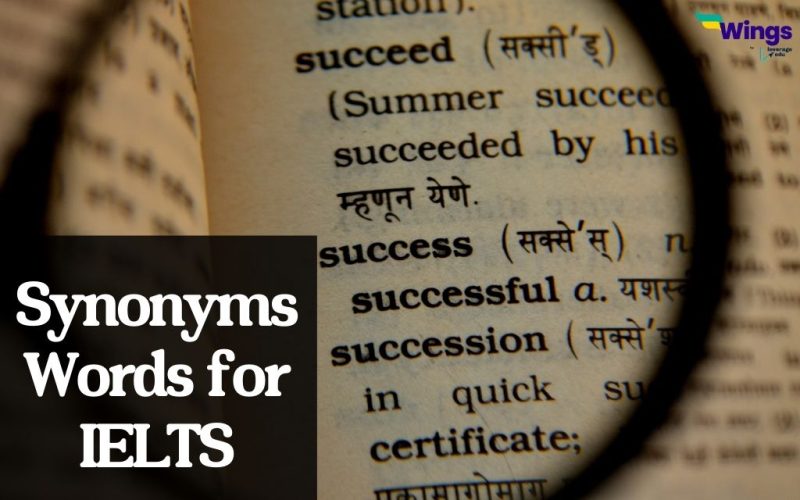For those preparing to take the International English Language Testing System (IELTS), building a strong vocabulary is essential. One way to expand your vocabulary is to learn synonyms for common words. Synonyms are words that have the same or similar meanings as another word, and they can help you express yourself more precisely and effectively. In this blog, we’ll explore some common words used in the IELTS exam and provide you with synonyms to help you broaden your vocabulary. We will also list down the reasons why is it important to use synonyms instead in the IELTS exam.
This Blog Includes:
Importance of Synonyms Words for IELTS
Using synonym words for IELTS can have several benefits that can help improve your overall score in the exam. Here are some of the benefits of using synonyms instead in your IELTS exam:
Demonstrates a Wide Vocabulary Range
The IELTS exam assesses your English language proficiency, including your vocabulary range. Using synonyms shows that you have a wider vocabulary and can accurately convey the same meaning using different words.
Avoids Repetition
Repeating the same words throughout your IELTS writing or speaking can make it sound monotonous and uninteresting. By using synonyms, you can avoid repetition and make your language more varied and engaging.
Increases Clarity
Sometimes, a word may have multiple meanings, and using the same words can also confuse them. By using synonyms, you can clarify the intended meaning of a word and can avoid any confusion.
Depicts a Higher Level of Language Proficiency
Using synonyms shows that you have a deeper understanding of the English language and can use it effectively to communicate your ideas. This can help demonstrate to the examiner that you have a higher level of language proficiency, which can lead to a better score on the exam.
Also Read: IELTS Reading Vocabulary: Check (Complete List)
Examples of Synonyms Words for IELTS
Here are some examples of synonyms for common IELTS words:
| S.No | Words | Synonyms | Usage |
| 1 | Important | significant, crucial, critical, essential, vital, paramount, fundamental, noteworthy, substantial, indispensable | The role of education in society is paramount. |
| 2 | Difficult | challenging, arduous, daunting, formidable, strenuous, demanding, | Learning a new language can be a daunting task, but it is possible. |
| 3 | Good | excellent, outstanding, remarkable, superb, exceptional, superior, splendid, first-rate, top-notch, high-quality | The service at this hotel was exceptional, and the staff went above and beyond for us. |
| 4 | Bad | terrible, awful, dreadful, appalling, atrocious, miserable, unpleasant, unsatisfactory, substandard, inferior | The food at this restaurant was terrible, we had to come back home to eat. |
| 5 | Big | massive, gigantic, colossal, mammoth, substantial, substantial, immense, considerable, significant | The new building was massive and can accommodate thousands of people. |
| 6 | Small | tiny, miniature, minuscule, microscopic, petite, little, slight, compact, puny, dainty | The kitten was so tiny that it can fit in both my hands. |
| 7 | Interesting | fascinating, captivating, intriguing, engrossing, absorbing, stimulating, compelling, entertaining, mesmerizing, and enchanting | The novel was so captivating that I couldn’t put it down until I finished it. |
| 8 | Boring | tedious, monotonous, dull, drab, uneventful, uninteresting, uninspiring, | The lecture was so dull that many people fell asleep during it. |
| 9 | Happy | content, joyful, delighted, elated, ecstatic, pleased, overjoyed, thrilled, euphoric, jubilant | I was overjoyed to hear that I have passed the exams. |
| 10 | Sad | unhappy, sorrowful, melancholy, mournful, despondent, dejected and tearful. | The news of her grandfather’s death left me tearful. |
| 11 | Easy | effortless, uncomplicated, simple, facile, undemanding, painless, straightforward, trouble-free, elementary, basic | The MCQs on the exam are straightforward to answer. |
Also Read: IELTS Vocabulary Writing Task 1: Check (Complete List)
FAQs
You can improve your knowledge of synonyms by reading extensively and using a thesaurus to find alternative words for common IELTS vocabulary. Additionally, you can practice using synonyms in your writing and speaking exercises to become more comfortable with them.
Yes, there are several online resources, including vocabulary lists and flashcards, that can help you learn more about synonyms for the IELTS exam. You can also consult a teacher or tutor who can guide you on using synonyms effectively.
No, synonyms are not the only way to improve your vocabulary range. You can also learn new words and phrases by reading extensively, watching English language media and also practising using some sample papers.
Candidates who want to prepare for IELTS or any other language proficiency test, can take help from this blog and strengthen their English score as well as their application. This will help them secure a spot in their dream college.
If you are planning to study abroad in the upcoming intakes get in touch with our study abroad experts at 1800-572-130.


 One app for all your study abroad needs
One app for all your study abroad needs












 60,000+ students trusted us with their dreams. Take the first step today!
60,000+ students trusted us with their dreams. Take the first step today!